Asserting rule: Spain seizes control of ‘independent’ Catalonia
Regional leader Carles Puigdemont deposed as thousands rally in Madrid in support for Spanish unity
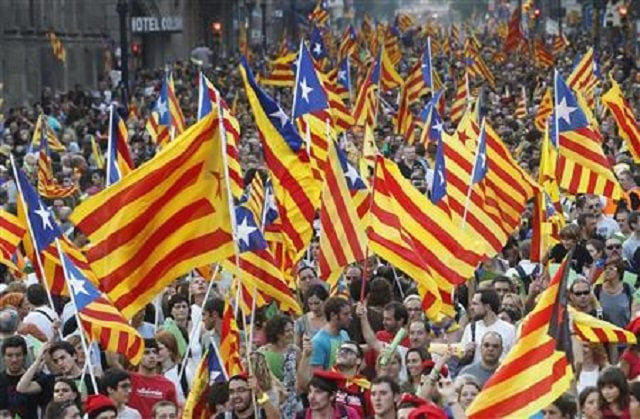
PHOTO: REUTERS
As thousands rallied in Madrid in support for Spanish unity, a government notice officially deposed regional leader Carles Puigdemont and his deputy Oriol Junqueras.
The announcement placed Deputy Prime Minister Soraya Saenz de Santamaria in charge of administering the region.
It is the first time the central government has curtailed autonomy in the region since dictator Francisco Franco's repressive 1939-75 rule.
Catalan parliament votes to split from Spain
Madrid also fired regional police chief Josep Lluis Trapero, seen as an ally of Catalonia's separatist leaders, and put the interior ministry in charge of his department in a move likely to further escalate tensions in Spain's worst political crisis in decades.
A day after Catalan lawmakers voted to break with Spain, the regional and national flags still fluttered side by side over the seat of the Generalitat, the name for the regional government.
The streets of Barcelona were largely empty after a night of firework-lit celebrations, and security was reinforced around the regional headquarters of the national police.
Some 3,000 people gathered on Madrid's central Plaza Colon, waving the Spanish flag as loudspeakers blared the popular song "Y viva Espana" (long live Spain).
A small child was pushed by its father in a buggy sporting a sign proclaiming: "Together", and some in the crowd wave placards calling for Puigdemont to be jailed.
"It is a shame what happened in Catalonia," lamented anti-secessionist protester Carlos Fernandez, a 41-year-old mining engineer.
Moving to quash what he termed an "escalation of disobedience", Prime Minister Mariano Rajoy responded to Friday's Catalan vote by assuming sweeping powers granted to him by the Senate under a never-before-used constitutional article designed to rein in rebels among Spain's 17 regions.
He fired the government and parliament and called December 21 elections to replace them.
On Saturday, Rajoy added Trapero, the highest-ranking officer in the Mossos d'Esquadra police force, to the list of heads to roll.
Trapero is accused by Madrid of disobeying court orders to block a banned October 1 independence referendum.
Instead, the ballot was disrupted, sometimes violently, by officers from Spain's national police and Guardia Civil paramilitary forces.
All eyes this weekend will be on whether Puigdemont and his team will willingly step aside for caretaker envoys from Madrid. Puigdemont has not spoken out publicly since Rajoy's announcement.
Saenz de Santamaria is due to meet Saturday with secretaries of state who will likely take charge of Catalonia's regional ministries.
The move to usurp Catalonia's wide-ranging powers is likely to anger many in the region of some 7.5 million people that enjoyed considerable autonomy, with control over education, healthcare and police.
Independence supporters have warned they will resist the temporary measures.
Thousands rally in Madrid, urge jailing of deposed Catalan leader
"We won't cave in to Rajoy's authoritarianism nor to 155," the far-left CUP party, a Puigdemont ally, tweeted on Friday.
A motion to declare Catalonia a "republic" was passed Friday with 70 votes out of 135 in the regional parliament, where pro-secessionists hold sway. Opposition politicians had stormed out in protest before the vote was cast.
Catalan leaders point to a "Yes" result in the deeply-divisive October 1 referendum as a mandate for independence, even though less than half of registered electors turned out.
Summarising widely-held fears, Federico Santi, Europe analyst at political risk consultancy Eurasia Group, warned the crisis could become violent, with "more serious clashes between national police and pro-independence activists."
The Spanish government has received unwavering support from the United States and its allies in the European Union.
The bloc is increasingly wary of nationalistic and secessionist sentiment, particularly after Britain's dramatic decision last year to leave the bloc.


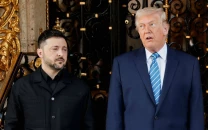
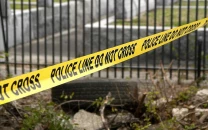
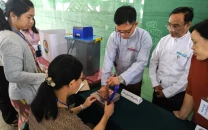
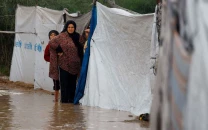




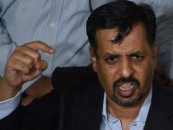

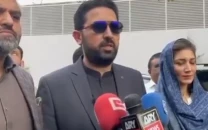






COMMENTS
Comments are moderated and generally will be posted if they are on-topic and not abusive.
For more information, please see our Comments FAQ